Hamudi, 1st generation Palestinian-American
Interviewed by Asma Barakat virtually, 11/15/22
Transcribed by Asma Barakat, 02/01/23
(00:00) Asma Barakat: This is Asma Barakat interviewing Hamudi on November 15, 2022 and this interview is taking place virtually. So I'm gonna start by asking you about where you're from and where you were born.
(00:16) Hamudi: Okay, so I was born and raised in Denver, Colorado. I'm from Colorado. And then both of my parents are originally from Palestine. Specifically, Nablus, and then also a small village like next to Nablus called Asira al-Shamali.
(00:39) Asma Barakat: Since you were born in the US, could you talk about the stories you heard growing up about Palestine?
(00:45) Hamudi: Yeah. So, you know, ever since we were kids, me, my brother and my sister, my dad really just instilled you know, all of Palestine into us, you know, whether that be history, you know, the Nakba. You know, all the historical facts, all the critical events that brought us to where we are today. So we were every day was like a conversation or a debate, or, you know, just a lesson on what Palestine is to us and what it means to us, and also just the history, but definitely, yeah, he talked a lot about different stories of him seeing the sea for the first time, praying in al-Aqsa, you know, him being a kid with his friends, and you know, their experiences as well. The first time he met my mother, they were from the same village. So, you know, he would talk about that, and similar things like that. So more of just his little experiences here and there, like in school and, and beyond that.
(01:45) Asma Barakat: Did how he talked about Palestine affect your identity growing up as a Palestinian?
(01:50) Hamudi: Oh, 100%. I mean, it made me love Palestine, even more, you know, mainly want to visit and I mean, I visited, so when I was born, I was born in '98. And my parents, my mom took me to Palestine, about 40 days after I was born. So that was the first time I ever was in Palestine. And I would visit a couple more times throughout the years, like when I was one or two years old. But my first vivid memory of visiting Palestine was the summer before my freshman year of high school, and just everything that my dad talked to us about, just came to life. And it was just amazing to be able to be there and experience that. Yeah, through his stories, it really just made me fall in love with my country even more, and want to talk about it with everybody.
(02:39) Asma Barakat: That's awesome. This could be from any of your trips to Palestine or just growing up around to your family who's Palestinian, but what memories of the tradition or cultural practices kind of stick out to you the most?
(02:52) Hamudi: Well, the big one, I mean, my family is a bunch of fallahi's, you know, so farming and, just, you know, gardening and stuff was really instilled in our family. We have like a beautiful big luscious garden in our backyard. You know, we grow betinjan and filfil and koosa and na'na' and all that. One big tradition that I haven't really been able to experience, really, but I know of is our olive oil harvesting. My father owns a masara in Nablus. And every year, he's actually there right now, every year in September, he goes to Palestine. And he begins the harvesting process. And yeah, so he harvests olive oil. And then he stays there for about, a couple months until Christmas time is when he usually comes back. And then the shipment comes in January, and then I help him sell the olive oil to people in the States. So definitely olive oil harvesting. And, you know, olive oil is just I feel like such a big staple in Palestinian society and culture. So yeah, that's definitely also a big part of our tradition.
(04:00) Asma Barakat: Wow, that's awesome. I've interviewed a couple fallahi's before, but you're the first one who gets to have that cool thing in your family that keeps on going. So that's so awesome for you guys. Let's talk a little bit about your family's story of forced migration. Was it like- a forced [situation] to leave? During an Intifada? How did they "choose" to leave? And yeah.
(04:21) Hamudi: So my dad came to America, I believe it was '79. Right before the 80s. He wasn't necessarily forced to leave, physically, it was more so the occupation was just making life very difficult. And also, you know, just for employment, you know, for finding jobs, for making money, for education. And, you know, I feel like also education is also a big part of Palestinian society. And, you know, also in Palestinian families, they instilled that in you of like, getting a degree and going to college and all that and my father wanted that experience. So he left for America in '79 He was about 18 or 19 years old, didn't know a word of English, didn't have barely any money in his pocket, and worked for years and years and was able to, you know, build a foundation for himself here. And then in '96, he went to Palestine and engaged with my mother. And '97 they got married, he brought her here to Colorado, and they had me in '98.
(05:23) Asma Barakat: You're the first one! Do you guys ever as a family talk about when Palestine is free? Would it be like, the right of return? Being able to live there without those difficulties? Do conversations like that ever come up?
(05:42) Hamudi: Yeah, definitely. I feel like we talk about liberation every day. I mean, every time, you know, I have a conversation with my dad. And we're talking about Falasteen, it's always about, you know, this future aspect of, we're going to end up there, and we're going to live there. And he's also instilled that into my brothers and sisters as well that even though we have our lives here in America, that eventually in the future, we're going to settle in Palestine. But we also look at it as a situation of regardless of what happens, you know, of course, we always think about liberation every day, and we talk about it, but I think, regardless of whether Palestine is free or not, we are going to return. And, yeah, it's just something that's, it's gonna happen regardless, so.
(06:28) Asma Barakat: Oh, my gosh, I love that you're gonna force it, either way. So, that brings me to one of our questions of what does home mean to you?
(06:42) Hamudi: I think home is more of a feeling than it is a physical place. You know, I look at it as somewhere where I feel at peace, where I'm comfortable, where I'm able to express myself unconditionally, where I'm surrounded by people I love and support and people who love and support me, where I feel free. But most of all, just a place where I feel comfortable and at peace and knowing that nothing in the outside world can disrupt that.
(07:12) Asma Barakat: Good answer. So we are going to ask a general question about religion. So is your family or are you religious? And if so, how did religion kind of play a role in your childhood?
(07:27) Hamudi: So, I wouldn't say my family's religious necessarily, we're definitely, we're Muslim, but, we're not, I mean, I haven't been to a masjid in years. And we don't, you know, we're not that type of family that prays five times a day and, you know, follows every aspect of Islam. But you know, Islam is still a part of who we are. I kind of had a disconnect with Islam when I was younger, probably, maybe the end of middle school, high school, you know, I wasn't really, you know, and that's another thing is like being in America, and being surrounded by, you know, other people and kind of feeling that disconnect kind of affects that. But I've always felt close with Islam, I feel like it is a part of who I am regardless. And, yeah, I think just as the Palestinian, Islam is a part of me in wherever I go, no matter whether I'm super religious or not, I'm still gonna always consider myself a Muslim. And I'm so always going to feel like I have this duty to defend Islam and to, you know, stand up for Muslims in the Ummah and all that, so.
(08:31) Asma Barakat: I can definitely relate. You brought up how being in America kind of makes it sometimes a little difficult to connect. Could you relate that even to your Palestinian identity, whether as a Palestinian Muslim does Palestinian like is it hard to just express yourself here?
(08:46) Hamudi: Yeah, I mean, the thing is, I feel like there's two sides to it, you know, one side is, you know, I have a lot of privilege and a lot of freedom in America, and I'm able to express myself in different ways, but also America's very ardently Zionist, and, you know, and we see it through every aspect, you know, through school, through our education systems, through work. So definitely, it's affected me, but I don't think it's kind of scared me or feared me into kind of hiding, I think more so it's kind of a blessing in a way to kind of continue to remind me of who I am, my identity, and why I have to keep fighting. You know, so like, and just everywhere I go, there's just a reminder, you know, I work 10 minutes, from a Jewish center that has an Israeli flag waving and all that so it's constantly just a reminder of who I am, where I come from, and that I need to continue fighting for this.
(09:41) Asma Barakat: Does, so you definitely have your connection to Islam. But does religion, or just regardless of religion, even, your morals, or your values, how do they kind of allow you to think about Palestine, maybe think about liberation through your morals or through even if it's a religious value set?
(10:08) Hamudi: Um, definitely the aspect of religion I feel like you know, as Muslims, we have this idea of standing up for the Ummah and, you know, constantly fighting for liberation and fighting to end discrimination everywhere we see it. I feel like as a Palestinian, but also as a Muslim, I have a duty to, you know, stand up for what I believe is right and stand up for the oppressed, and also to, you know, fight against racism and discrimination everywhere that I can find it, whether it be in America or in Falasteen, or in any other part of the world. So I feel like that's definitely morally what has motivated me to do through my religion.
(10:46) Asma Barakat: Yeah, that's a great answer. Let's see, how has being in the diaspora affected your relationship with other Palestinians?
(10:59) Hamudi: So I'm in, Colorado, there's barely Palestinians here, which really kind of sucks. But, I mean, I wish to meet other Palestinians. I always... every time I meet a Palestinian, it's like, I'm in heaven, you know, it's just like, wow, you know, it's just the best thing. But, I haven't really had the chance to create that bond with, a group of Palestinians or a community, which is very difficult. But I guess how it affects me is, I strive to find Palestinians everywhere I go, it's like, you know, are you Palestinian? Where are you from? Like, what city, all that? So I'm definitely always looking and seeing if there's a Palestinian.
(11:39) Asma Barakat: That's awesome. You should come to New York. There's a lot of us here.
(11:45) Hamudi: I know, and Chicago.
(11:46) Asma Barakat: Yeah. Definitely in Chicago as well. What question do I want to ask? What is your favorite memory from one of the times that you visited Palestine?
(12:07) Hamudi: Okay, my most favorite memory, I think, was the summer of 2019. I visited the first time we snuck into Jerusalem because I mean, I'm not allowed because I carry a Hawiya. And so we snuck into Jerusalem. And it was the first time I prayed in Al Aqsa, and it was the first time I saw the Mediterranean. I went to Akka, I went to Haifa, I went to Yaffa, and really just got to experience the homeland. And it was just so beautiful, just to be there. It was also kind of sad too, you know, to see that this is everything that we've lost. And that was stolen from us. But it was just it was a beautiful memory, just to be able to experience all of that, especially just being at the sea. I don't know what it is. But being at the sea just really takes my breath away. Especially, you know, in Palestine, but yeah, definitely that memory for sure.
(13:01) Asma Barakat: Yeah, I can only imagine. That must be so beautiful. Do you, if you want to, you could talk maybe about how having a Hawiya, kind of affects you. The hardship that comes with having a Hawiya. Yeah.
(13:16) Hamudi: Yeah. So I feel like there's perks, that there is a perk of having a Hawiya. And that is, you know, you can get into the West Bank, you know, no matter what. But the downside is, yeah, I can't step foot in any part of '48, I can't go to Jerusalem. You know, I have to go through a long process of being able to enter. But yeah, I mean, crossing the Jisr is the most dehumanizing thing ever. I mean, I've waited hours at checkpoints before. I've been questioned. My parents have been detained. I've been spit at by settlers I've been, you know, I've experienced almost anything you can imagine with, you know, the treatment of Palestinians in the West Bank. So it is very difficult. But I'm really blessed and happy that my parents got me to get the Hawiya, because at first, I didn't want to because I was like, if I get the Hawiya I can't see Jerusalem, I can't go to '48. But now, you know, I can still have, you know, unconditional right to go to the West Bank and go to my hometown and my village and at least experience that.
(14:21) Asma Barakat: Yeah, that's so amazing for you. My parents had the same debate and they ended up not getting us one. And I'm like, no, wish I had one now.
(14:30) Hamudi: My dad lost his, my dad was to Falasteen as a tourist. So back in the early 90s, he got his confiscated. And so he's only [indecipherable] and recently I was just in Falasteen also this summer for, we were going to go for my cousin's wedding. And her mother's Jordanian, like Jordanian citizenship and she got denied entry so they had to move the wedding to Jordan. And they passed new law or something where like, a spouse of a person who carries a Hawiya is not allowed. They're banning entry for anybody like that because they're trying to separate families and cause all that chaos. So my mother was kind of nervous about him entering and being denied. He had to like, go through a process basically, of getting a whatever it is to like, get in, a card or whatever.
(15:28) Asma Barakat: Wow, that is so ridiculous. And just goes to show the lengths that people in America probably don't realize happens to Palestinians, even though it's funded by America, which leads me to my next question. So since you're living in the US, which really funds... Well, multiple imperialist projects, but obviously, number one, the occupation of Palestine? How do you find hope and strengthen resilience in that?
(16:00) Hamudi: Conversation. I think that's the biggest thing. I feel like, as long as I have the freedom and the ability to educate people and to continue having conversations about Falasteen, then I feel very strong, and that I'm doing something good. And also, you know, I'm an actor, and I'm a writer. And I feel like all of my art and everything that I do revolves around Falasteen, and, you know, my poetry. You know, when I, when I write screenplays, or when I'm acting, I try to do it all for Palestine. But yeah, I feel the biggest thing, though, is being able to have conversations. I mean, all my friends are super anti-Zionist, and fucking hate Israel. And, you know, they're all very, you know, they understand that, and I just love being able to speak about that freely, and being able to just communicate that to people, you know, the ability to protest, you know, being able to boycott whatever I want. I think those also just make me feel like I am doing the work. And that I'm a part of the liberation, and I'm part of the cause, and that I'm doing whatever I can for it.
(17:06) Asma Barakat: Yeah, that is so awesome to have that connection, even though we're in the diaspora, like Palestine, lives within us. You can talk a little bit more about how your art kind of shows Palestine.
(17:20) Hamudi: Yeah, so definitely mainly with my poetry. I definitely, I love to write poems, and I'm a poet. So I definitely try to revolve a lot of my poetry to, you know, many themes within Palestine, whether it be like personal stories that I've heard, or experiences that I've had, or, you know, stories that the Nakba or, just the effects, the lingering effects of settler colonialism and occupation. I definitely just tried to really instill all of that in my work, and in my writing. When it comes to my acting, I just feel like the emotions that I feel, you know, all of the frustration, the anger, the sadness, the devastation, it all goes into every character that I play, so, yeah, definitely. All of that is just inspired by Falasteen. Falasteen wa bes, you know what I mean?
(18:12) Asma Barakat: That's awesome. I think an interesting question to ask Palestinians who live in America is, how do you identify? Do you like saying you’re Palestinian American? Are you like, saying that you're a Palestinian living in America?
(18:29) Hamudi: Kind of a difficult question because I kind of bounced back and forth with that, you know, I mean, I feel like, you know, theoretically, yes, I am a Palestinian American. But it just, I feel like I'm kind of screwing myself over and my people over when I say that, because of how America has supported our ethnic cleansing, and, you know, everything that Israel has done to us, so, I don't know, I guess it changes but I mean, I think right now, I just say I'm Palestinian. I mean, when I when people say where I'm from, are we gonna what is my identity, I say Palestinian. And I'm very proud when I say it, so, yeah, so definitely Palestinian, I would say.
(19:07) Asma Barakat: That's awesome. I can definitely relate to that too. Do you feel like you differ from other generations in your family about how you view Palestine, maybe your parent's generation or even your grandparent's generation?
(19:23) Hamudi: Yeah. So I think because my grandparents and my parents actually experienced a lot of what happened, you know, the Intifadas, you know, my grandfather was alive during the creation of Israel and the Six-Day War and all of that stuff. You know, they really have a lot of trauma and they really just went through a lot, they experienced it all. Versus me, I feel like because I didn't really experience much of those critical events that happened. I'm able to still you know, dedicate the majority of my life to that and to fighting for the cause because, you know, it's settled it in for me in a way that this happened and I can use my time and my life to just dedicate fighting for that, and fighting for Falasteen, and I just feel like for my grandparents and for my parents, it was they were too busy trying to survive and trying to, you know, fight for their lives. And I feel like now that I have the opportunity, and the privilege of you know, living comfortably that I could now dedicate my life to, to fighting for the cause.
(20:34) Asma Barakat: Wow, that's amazing. I feel the same way. And I never know how to articulate it as well as you did. But like, Yeah, our parents were just fighting to survive. It's kind of crazy. So if, on the flip side, if future generations of Palestinians or just anyone listens to your interview, what do you hope that they take away? Like, what's the key point that you want to instill in them?
(21:02) Hamudi: I think the key point is that Palestine lives through all of us, wherever we are in this world. You know, a life without freedom is not a life to live and as Palestinians, I feel like fighting for freedom is such a critical part of our identities and who we are. And I hope that they will continue to fight for that until their last breath. And then also, I want to emphasize, you know, this idea of resilience and all of its forms, especially for Palestinians in the diaspora, you know, whether it be protesting or boycotting or having conversations with friends or people at work, all of that benefits the cause, and all of that gets us an inch closer to liberation.
(21:43) Asma Barakat: Yeah, that's amazing. I agree as well. Is there anything else that you would like to say before we close up this interview?
(21:57) Hamudi: I don't know. I mean, fuck Canary Mission, fuck every zionist, you know, just fuck them all. Yes. And free Falasteen.
(22:10) Asma Barakat: Yay, that was amazing. Thank you so so much. I'm gonna stop the recording. Okay.

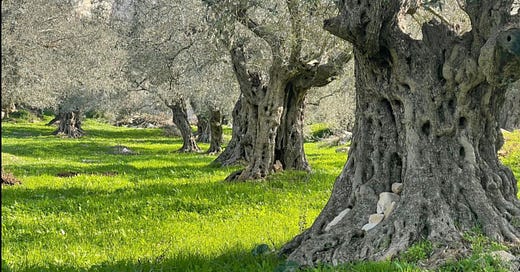
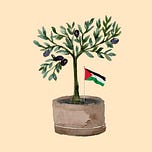


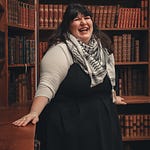
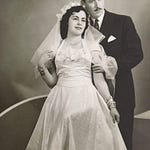

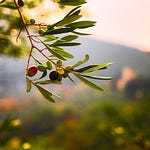
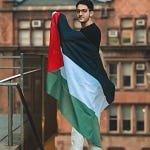
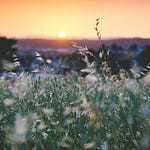
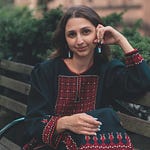
Share this post